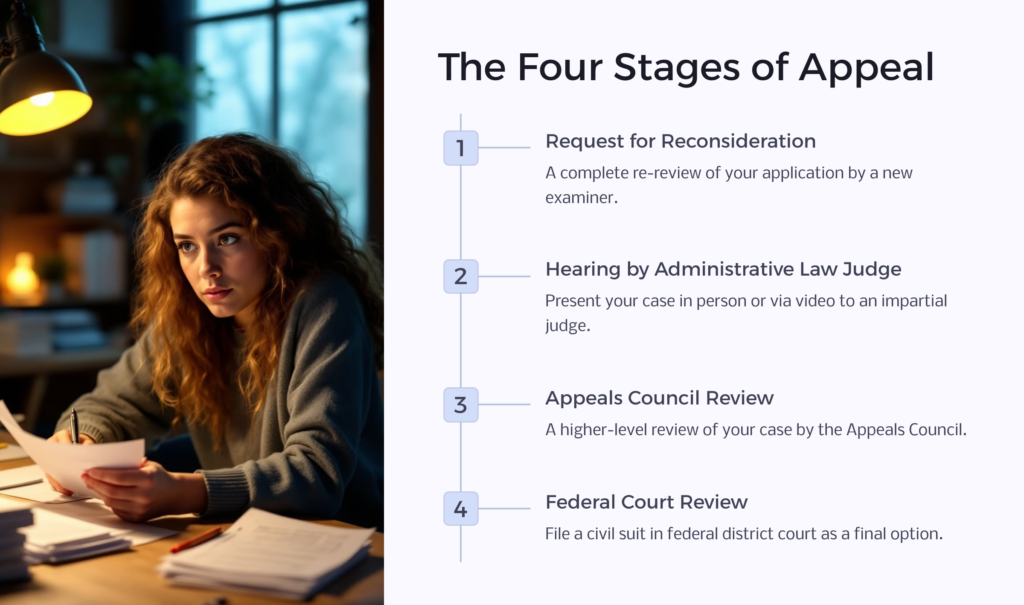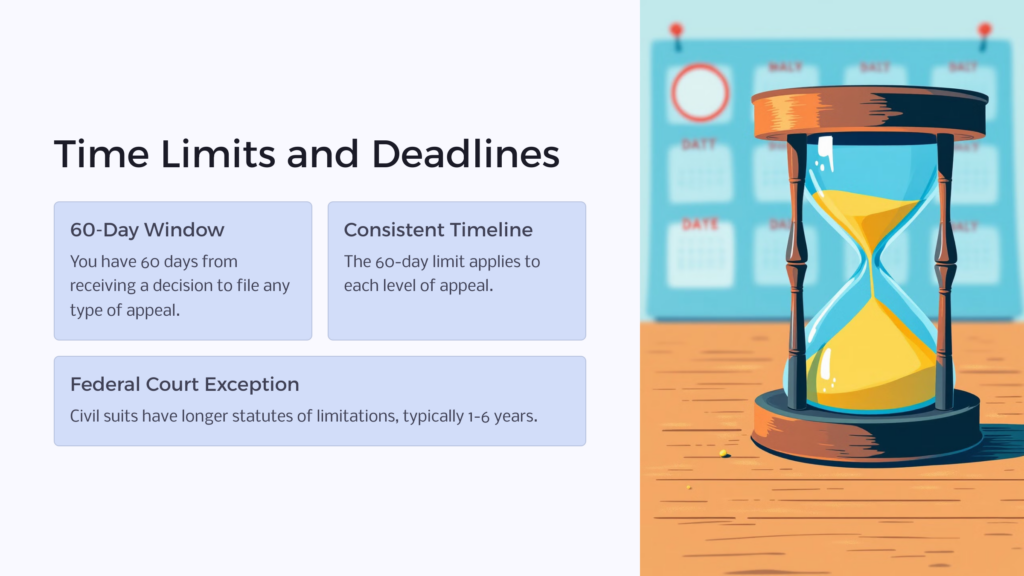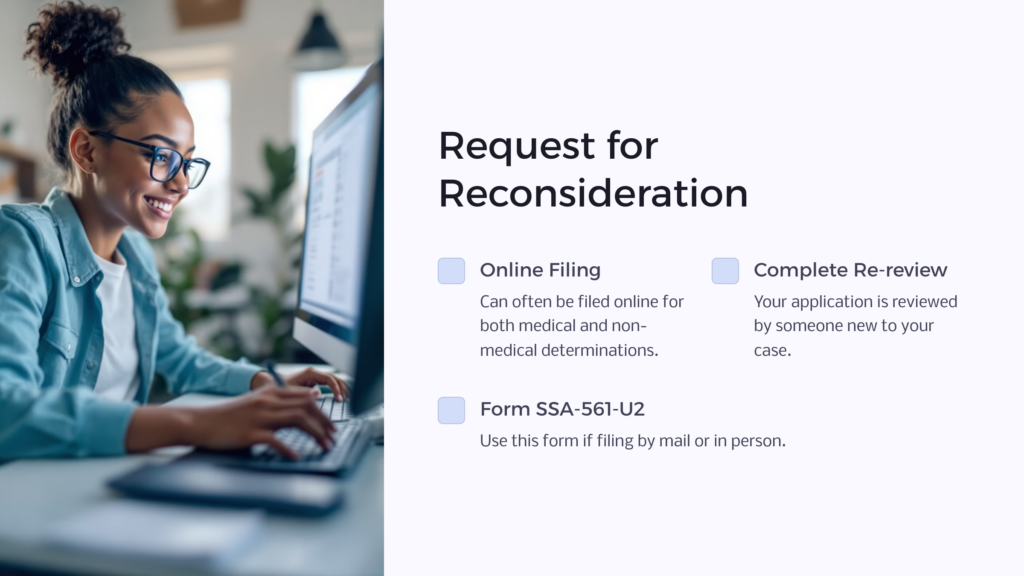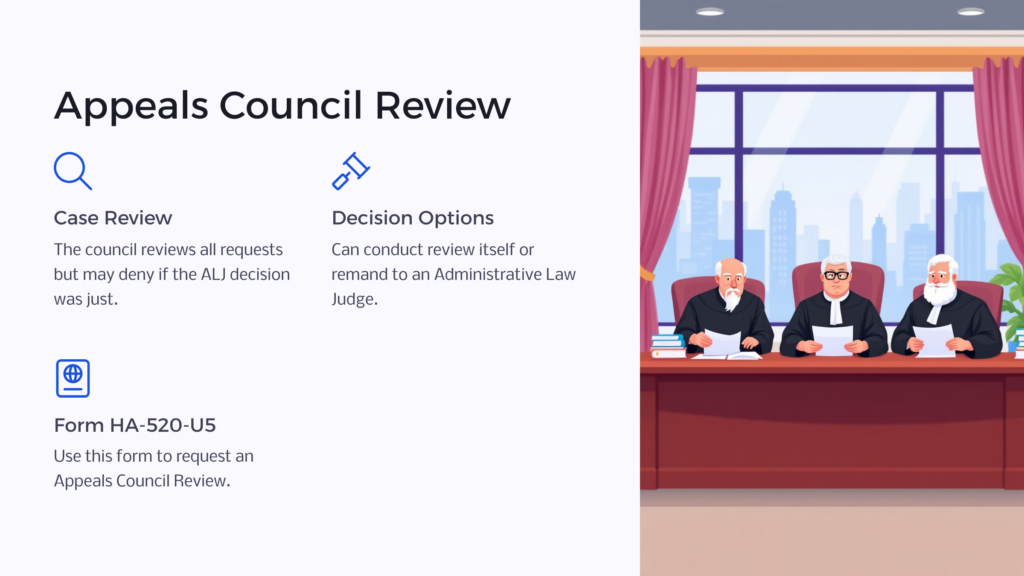If your application for Social Security Disability benefits was denied, you can file an appeal with the Department of Social Services. It might be wise to hire an attorney who can help you navigate the stages of the appeals process.
4 Steps of the Disability Appeal Process

- Request for Reconsideration
- Hearing by Administrative Law Judge
- Appeals Council Review
- Federal Court Review
Once you receive a decision letter in the mail regarding your application for SSDI benefits, you have only sixty (60) days after receiving the notice to request any type of appeal. The determination letter mailed to your home will also include a suggestion about what type of appeal you should pursue. The 60-day time limit also applies to the next level of appeal you will need to pursue, should you wish to contest the decision rendered by the review process.
For example, if you are dissatisfied with your request for a reconsideration, you will have 60 days to file for a hearing by an administrative law judge. If you are dissatisfied with that outcome, you have 60 days to file for a review by the appeals council. By contrast, filing a civil suit in court is subject to a statute of limitations, which in most jurisdictions ranges between 1-6 years. However, you will not want to wait that long, should you carry your appeal that high.

SSDI benefit payments were created by the federal government around the time of the Great Depression to assist disabled Americans unable to support themselves through work. Disability benefits are paid out to individuals with a working history who have earned sufficient credits to collect benefits if they can no longer work.
SSDI benefits are meant to help defray the cost of living expenses such as rent or mortgage payments, and necessities like food and local travel. Many Americans who are unable to work rely on these benefit payments to cover living expenses, so they look forward to receiving a positive response of approval for their initial determination.
However, sometimes an expectant claimant will receive a denial letter. In these cases, the initial claim filed by the applicant met with an initial determination that resulted in a denial of benefits from the Social Security Office. You will need to initiate the appeals process by filling out the appeal form. Usually, the first step towards a reconsideration decision is a request for a redetermination.
Social Security Appeal Process and Required Forms
Filling out SSDI forms can seem onerous enough. To get a denial letter in the mail is very disappointing. Fortunately, the decision is not set in stone. There are steps to appeal that you can pursue, whether you were applying for SSI or SSDI. In this article, we focus on disability appeals.
Request for Reconsideration

A request for consideration can often be filed online. There are several different types of reconsideration, but each type involves a complete re-review of your SSDI application by someone other than the person who made the first determination. Make sure to check in on the status of your SSDI Reconsideration via your personalized my Social Security account online, whether you applied online, over the phone, or in person.
If your disability claim was denied for medical reasons, you can request a reconsideration online for a medical determination right from the SSA website. If your determination letter indicated that benefits were denied for non-medical reasons such as income, financial resources, or living arrangements, you can request a reconsideration online for a non-medical determination.
Required Social Security Appeal Form – SSA-561-U2
Though you can initiate your request for reconsideration online, should you mail in a form or fill it out at your local SSA, the form that initiates your request is SSA-561-U2. Your best bet, however, to streamline the process and make it move forward as quickly as possible, is to use the online form. You are allowed to have assistance filling out the paperwork, though you will need to indicate such an arrangement has been made.
Hearing by Administrative Law Judge
It is possible to skip right to a hearing in your initial request for an SSDI reconsideration, but a hearing by an administrative law judge is often for applicants who are dissatisfied with their SSDI reconsideration. An administrative law judge who was not involved in the determination or redetermination of your case can assess your case in person, so you will need to make sure you have all the documentation that could be pertinent—and it will most likely be indicated in your decision letter. Hearings can be done by video at a hearing site, or in person, within a 75-mile radius of your home. The SSA will make every attempt to provide the most convenient arrangement for you.
A hearing by an administrative law judge, commonly referred to as an ALJ hearing, is available for applicants that agree with medically related denial of their SSDI benefits. It is also available for applicants who disagree with a decision by the SSA for non-medical reasons such as income, financial resources, or living arrangements. For either type of hearing by an administrative law judge, those making the appeal will receive a packet in the mail detailing the hearing procedure and providing an option to opt out of a video hearing, for those applicants who would have a harder time making their case in a tele-hearing.
You are also allowed to sign a waiver, relinquishing your right to appear in front of the administrative law judge who will review your claim, should you feel that your presence is not necessary for building your case or explaining any specific circumstances in person. Hopefully, the ALJ hearing will result in a reconsideration decision that is favorable for you, but if not, it’s important to realize that the ALJ’s decision is not a finality, should you find it unfavorable.
Required Social Security Appeal Form – HA-501-U5
You can initiate a request for a hearing online, but you can also fill out Form HA-501-U5. If the time or location of the hearing is inconvenient for you, you’ll need to quickly fill out Form SSA-769-U4 and request a change, because missing your appointment can create a serious setback in your appeals process.
Appeals Council Review

The Appeals Council for the SSA is headquartered outside of Washington D.C. in Falls Church, Virginia. Originally made up of three members, today it includes 53 Administrative Appeals Judges, 44 Appeals Officers, and support personnel numbering in the hundreds. The Appeals Council looks over all requests for a review, but if it feels that a previously held hearing by an administrative law judge justly made its decision in accordance with the regulations and laws that guide the Department of Social Services, it will deny your request.
However, if the Appeals Council feels that your case merits a review, it will conduct the review itself or return it (remand it) to an Administrative Law Judge. You can request an Appeals Council Review online. The Administrative Council reviews around 150,000 cases per year, but the appellate does not appear in person. They may, however, appoint a representative such as a Social Security disability attorney to represent your case.
Required Social Security Appeal Form – HA-520-U5
If you are dissatisfied with the decision of an administrative law judge at your hearing, you’ll need to fill out Form HA-520-U5, Request for Review of Hearing Decision/Order. Make sure your form says something about requesting an Appeals Council Review. If it does, you’re filling out the right form.
Federal Court Review
If you disagree with the decision of the Appeals Council or feel that they have unjustly declined to review your appeal, it might be time to file a civil suit in court—and not just any court, but a federal district court. This case will not be filed with the SSA, and it cannot be filed online. Rather, you must initiate the case by filing it in the federal district court in your area. You can also file at the United States District Court for the District of Columbia. The fee to file the case is $400, but there may be other costs you incur such as paying representative legal counsel. After a Federal District Court Review, there is no other level of appeal.
Required Social Security Appeal Form
There are no online forms to fill out for a federal court review. Filing a civil suit in a Federal District Court is not done through the Department of Social Security, but the US Court System. You will need to file a legal complaint that must adhere to specific rules of formatting and presentation (such as being typed or handwritten with ink, not pencil).
You will also need to fill out a Civil Cover Sheet, which can be obtained online, and will provide some boxes to check and questions to answer that gives a brief overview of your intended case. You must also file a separate summons to call the offending party (in this case, the SSA) to the Federal District Court.
If you are unable to pay the $400 fee for filing the case, you can fill out a Motion to Proceed In Forma Pauperis to have that fee waived. Because of the exacting nature of the forms and procedures involved in filing a case in Federal Court, it is highly advisable to have professional legal counsel helping you with your case.
Do I Need a Disability Attorney?
It certainly helps to have qualified legal counsel helping you navigate through anything bureaucratic. However, the first level of appeal, the request for reconsideration, will just involve filling out the forms to request a reconsideration of your case, which is done by the SSA. There is no hearing, so there is no opportunity for legal counsel to assist in making your case.
The next level, the hearing by an administrative law judge, may have a better chance of moving toward a desired outcome if you solicit legal counsel. You can also make the case yourself and collect and present the necessary documentation. If that fails, a request for a review by the Appeals Review Council will not allow you to make the case in person, but you can elect a representative, so that indeed would most likely be in your best interest, since you cannot be present at the review.
Finally, a Federal District Court Review is an actual court case, so you should solicit legal services for presenting your case. Denials are common. Recent data suggests that around 14% of requests for a reconsideration see a reversal, though 85% go on to a hearing. However, once appeals enter the higher stages of appeal, such as a hearing, the Appeals Review Council, or a Federal Court Review, reversals are fairly successful at a rate of 78%. That said, you should not get discouraged if your determination letter is unfavorable, and push the case as high as you can go.
Download Appeal Forms
Please click on the link below to open your desired form in a separate browser window.
SSA-561-U2 Request for Reconsideration
HA-501-U5 Request for Hearing by Administrative Law Judge
HA-520-U5 Request for Review of Hearing Decision/Order (Appeals Council review)
SSA-769-U4 Request for Change in Time/Place of Disability Hearing
SSA-827 Authorization to Disclose Information to the Social Security Administration
SSA-789 Request for Reconsideration – Disability Cessation
SSA-1696-U4 Appointment of Representative
SA-3441-BK Disability Report – Appeal
Use to submit additional or updated medical information for reconsideration appeal
HA-4631 Claimant’s Recent Medical Treatment
To submit additional or updated information for a hearing
HA-4632 Claimant’s Medications
To submit additional or updated medication information for a hearing
HA-4633 Claimant’s Work Background
To submit additional or updated work activity or information about work for a hearing
 Benefits.com Advisors
Benefits.com Advisors
With expertise spanning local, state, and federal benefit programs, our team is dedicated to guiding individuals towards the perfect program tailored to their unique circumstances.
Rise to the top with Peak Benefits!
Join our Peak Benefits Newsletter for the latest news, resources, and offers on all things government benefits.




















